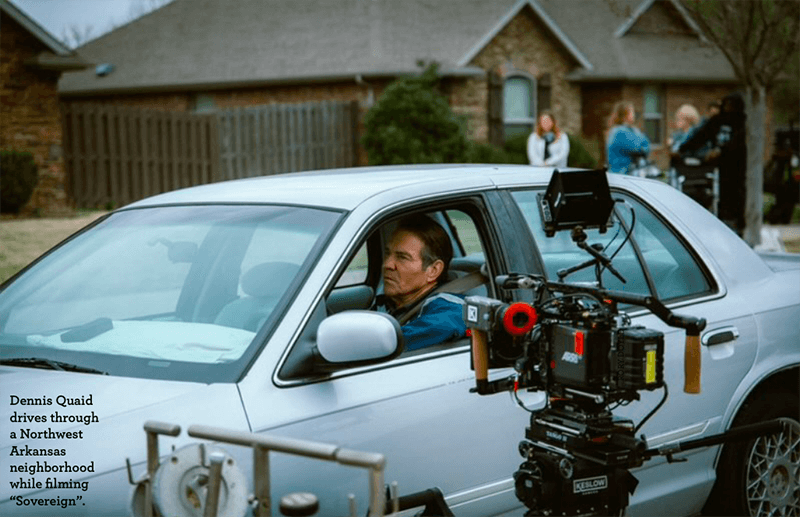VOLUME 11 | 2025 BLOCK, STREET & BUILDING
Arkansas is uniquely positioned to become one of the rugged trails of the Ozark and Ouachita mountains to the serene waters of the Buffalo River and the Arkansas Delta, The Natural State offers an unparalleled mix of biking, boating, hiking, hunting, canoeing and fishing. But building a sustainable and inclusive outdoor recreation economy requires more than scenic landscapes — it demands a strategic investment in placemaking, the creative economy and the infrastructure that connects communities to this thriving sector.

OUTDOOR RECREATION AS ECONOMIC ENGINE
According to the U.S. Bureau of Economic Analysis, outdoor recreation contributed $862 billion to the national economy in 2022 and supports over 4.5 million jobs. In Arkansas, this translates to a growing sector responsible for more than $3.5 billion in economic impact, employing almost 40,000, according to the Arkansas Department of Outdoor Recreation.
Much of this growth is driven by mountain biking in Northwest Arkansas, where investments by the Walton Family Foundation and public-private partnerships have turned Bentonville into a world-class biking destination. But opportunities exist far beyond the northwest corner of the state. With the right investments and policies, Arkansas can expand its reach to every region, transforming small towns and urban centers alike into outdoor hubs, each serving as a “base camp” for exploration.
PLACEMAKING AND THE RISE OF THE BASE CAMP COMMUNITY
The concept of a base camp isn’t just about lodging — it’s about creating a sense of place. A base camp community offers gear shops, local eateries, breweries, distilleries, wineries, repair services, guides, shuttle services, cultural venues including film and music production studios, and comfortable accommodations that together enhance the outdoor experience. These places provide the “stickiness” that turns a day trip into a weekend stay, and a weekend stay into an annual tradition.
Effective placemaking begins with infrastructure — bike-friendly streets, riverfront trails, marinas and transient docks along navigable rivers, camping facilities, signage and broadband — but it is sustained by authenticity and creativity. Art installations, local food and music and locally produced film and media content help reinforce a town’s character while inviting others to explore and invest.
TYING IN THE CREATIVE ECONOMY
According to the BEA, the creative economy sector had an economic impact of $2.01 billion, employing almost 33,000 jobs in Arkansas in 2023. This represents a 7.5% growth in jobs from the previous year, which ranks second in the nation. Jobs in this sector include museums, theaters, music venues, filmmaking, design, publishing, broadcasting, musical manufacturing, etc.
Placemaking and the outdoor economy intersect with the creative economy in powerful ways. For example, Arkansas has made strides in supporting digital product development, music production and motion picture incentives, but these programs remain underfunded and thus underutilized. If we want to make our communities true base camps, we must tell their stories effectively and support the creators who bring those stories to life.
Motion pictures, outdoor media and digital storytelling are essential tools for economic development. They market towns and landscapes to global audiences, showcasing the state’s natural beauty and community charm. Films like “Mud,” shot along the Arkansas River, or a digital series about the Arkansas Highlands Trail are more than entertainment — they are long-tail economic engines, influencing tourism and relocation decisions long after their release.
With adequate funding, Arkansas can provide incentives to filmmakers, animators, VR/AR developers and digital content creators who work in tandem with the tourism and outdoor industries. Coordinating this with regional economic development strategies will help elevate not just one area, but the entire state.
EQUITY AND REGIONAL BALANCE
To maximize the impact of this approach, Arkansas must ensure that rural and underserved areas are not left behind. That means extending trail systems, enhancing state park access and expanding incentive eligibility beyond traditional urban centers. Programs should be structured to reward regional collaboration — for example, projects that link mountain biking routes in the River Valley to canoeing trails in the Ouachitas, or that pair cultural festivals in the Delta with outdoor adventure itineraries such as biking on the Delta Heritage Trail and Big River Trails.
WORKFORCE DEVELOPMENT AND EDUCATION
Another critical piece of the puzzle is talent. Arkansas should invest in workforce training programs that prepare residents for jobs in outdoor recreation, hospitality, film production, design and digital content creation.
Moreover, local internships and apprenticeship programs can be aligned with tourism departments, production companies and retailers. This not only builds skills, but it also keeps young people connected to their hometowns and creates pathways to fulfilling careers without having to leave the state.
POLICY RECOMMENDATIONS
To realize this vision, a few strategic policy shifts are needed on the state and local level:
Increase Funding for Incentives by Significantly Increasing or Eliminating Altogether the Annual Caps — The state looks at any annual allocation for a tax incentive as an expense to the state budget; however, the estimated tax revenue created from these incentives is not counted. Because of this approach to budgeting, Arkansas does not adequately fund digital product and motion picture rebates, historic and Central Business Improvement District tax credits, among others. Arkansas is woefully behind every neighboring state, but it can generate significantly more tax revenue than the incentives pay out, which can be used to fund future income tax cuts and/or other priorities for the state.
Establish a Base Camp Grant Program — Provide grants to communities and regions that are developing outdoor recreation and placemaking infrastructure. The “Arkansas Great Places Act” may be an option to fund this.
Strengthen Regional Partnerships — Encourage cross-county partnerships through collaborative trail development, for example. Utilize the “Regional Mobility Authority Act” to give these partnerships more taxing authority to build and maintain this infrastructure.
Integrate Outdoor Recreation, Placemaking and Creative Economy Strategies — Coordinate efforts across state agencies, including Parks, Heritage and Tourism, Economic Development and Workforce Development to support initiatives that bridge outdoor recreation, historic preservation, downtown revitalization and cultural initiatives.
Small Business Loan and Grant Programs — Designed to support local entrepreneurs: bike outfitters, shuttle operators, eco-lodges, artists and chefs. These small businesses are the heart of base camp communities and often need only modest investment or technical assistance to thrive.
Young talent and remote workers are drawn to places that offer lifestyle amenities — trails, lakes and downtown vibrancy, thereby growing Arkansas’s population.
In short, investing in the outdoor recreation and creative economies through placemaking should be Arkansas’s primary focus on an overall economic development strategy. It’s also a workforce retention and a health and wellness strategy that will ultimately generate revenue and reduce expenses needed to fund the state’s needs.
CONCLUSION: MAKING THE NATURAL STATE A NATIONAL MODEL
Arkansas has what it takes to lead the country in outdoor-based economic development. Our terrain is unmatched. Our communities are resilient. And our tourism brand — The Natural State — already tells the story.
But capitalizing on these assets requires more than branding. It demands intentional policy, coordinated investment and support for local implementation. By making placemaking a pillar of state economic strategy, Arkansas can ensure that every community has the tools to succeed.
Imagine a future where every Arkansan lives within 10 minutes of a trailhead, a boat launch or a walkable downtown. A state where small towns become magnets for visitors, businesses and new residents. A state where “Base Camp Arkansas” is more than a slogan — it’s a statewide blueprint for economic growth.
Arkansas is no longer a hidden gem. The secret is out: Our state offers world-class outdoor adventure, breathtaking beauty and a growing culture of creativity and innovation. But to truly capitalize on this momentum, we must think holistically, combining recreation, arts, entrepreneurship and place-based policy into a shared vision.
Greg Nabholz is CEO of Nabholz Properties in Conway and a Placemaking economic development consultant.
